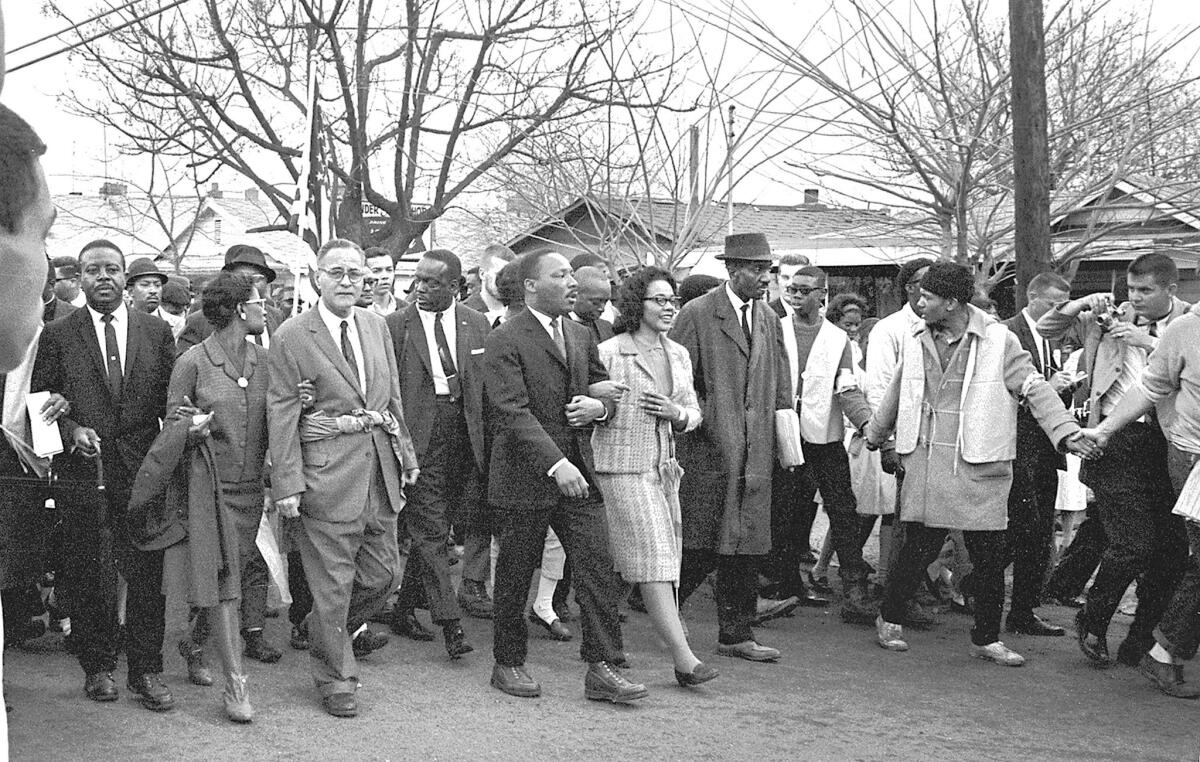Readers React: Did ‘Selma’ go too far in its portrayal of LBJ?

- Share via
To the editor: Art represents transcendent truth and should not be held responsible for specific facts, a point that Rep. John Lewis makes in his piece on the movie “Selma.” On the surface this is understood. The transcending truth of “Selma” is the heroic struggle of Martin Luther King Jr. against the great evil of segregation. (“John Lewis tells his truth about ‘Selma,’” Op-Ed, Jan. 16)
Artistically, in “Selma” the overwhelming notion of struggle for civil rights would not be served thematically by a white, powerful president from Texas — Lyndon B. Johnson — aiding in it. He is more helpful as part of the current against which King was swimming.
The problem in “Selma” and other films that portray history is that on some level our minds do not make a distinction between art and fiction. As in such films as Oliver Stone’s “JFK” and the scurrilous account (if it wasn’t art) of the Catholic Church in “The Da Vinci Code,” psychologically, “art” becomes indistinguishable from “truth.” The two blend together in our minds.
There is no solution to this. We can only savor the contradiction.
Jack Kaczorowski, Los Angeles
..
To the editor: I am so annoyed by the people who try to make the movie “Selma” about President Johnson.
I know the movie gets some facts wrong, but Johnson’s character in “Selma” represents all the white “allies” who kept telling African Americans to be patient, to be calm, that it’s not the right time. He and the other allies in power didn’t put their bodies on the line to create the moment — the action in Selma, Ala., in 1965 — that finally shocked white America enough to get something done.
This movie is about the brave people — people like Lewis, King and others — who risked it all to secure the rights that they were entitled to under the Constitution.
Joanne Zirretta, Aliso Viejo
..
To the editor: Lewis’ assertion that the movie “Selma” is a work of art and thus should be granted artistic license is unconvincing.
He insists that “Selma” should not be weighed down with the responsibility of portraying history accurately, citing the movie “Lincoln.” He states that “Lincoln” was not completely accurate historically because it did not mention Frederick Douglas.
His analogy is false. “Lincoln” may have omitted the contributions of Douglas, but it did not falsely portray Douglas as pro-slavery. “Selma” falsely portrayed Johnson as opposed to the voting rights movement.
Lewis admits that Johnson was one of America’s greatest presidents, so how can he justify “Selma’s” portrayal of him as a villain? That’s not art, it is just a lie.
Patricia Doyle, San Gabriel
..
To the editor: I don’t know whether the Selma march was Johnson’s idea, as Lewis attempts to refute. In fact, I couldn’t care less. But his assertion that Johnson was one of our country’s great presidents is outrageous and offensive to anyone who lived through the Vietnam War.
Johnson gave in to those who wanted that war and concocted phony reasons to wildly escalate U.S. involvement, such as the Gulf of Tonkin incident. That left the blood of 58,000 dead American soldiers and hundreds of thousands of wounded and maimed on his hands, earning him history’s eternal scorn.
President Kennedy said that “in the last analysis, it is their war,” referring to the South Vietnamese. He added that we could help them, but they would have to win it. I believe he never would have gone down Johnson’s ill-fated path.
Aaron Mills, Solana Beach
Follow the Opinion section on Twitter @latimesopinion
More to Read
A cure for the common opinion
Get thought-provoking perspectives with our weekly newsletter.
You may occasionally receive promotional content from the Los Angeles Times.









